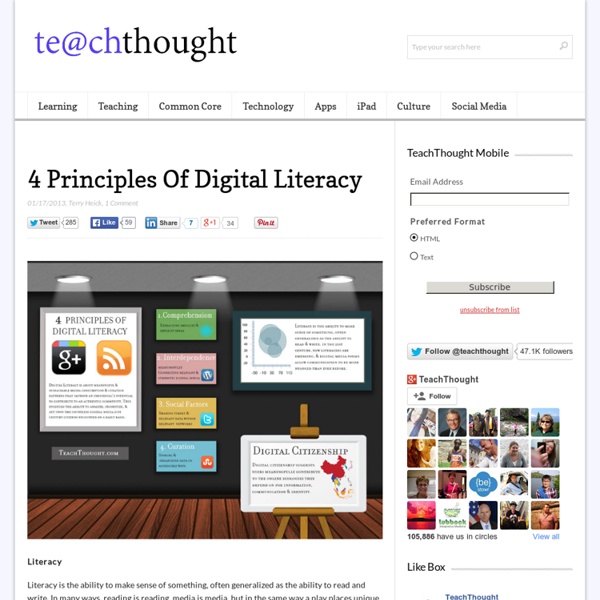4 Principals Of Digital Literacy

7 Reasons educators should blog
Like many others, I find blogging a useful activity. So useful, in fact, that I think everyone involved in education should do it! Here, in no particular order, are my reasons. Keep an online (research) notebook Blogging readiness, by Cambodia4Kids think some people eschew blogging because it can be frightening to expose your thoughts to the world. So, you might ask, what’s the point of that? One limitation of Evernote, and possibly other, similar, services, is that it’s hard to share all of the notes you’ve made, unless you email them or tweet them out. Why might you want to do this even if you are not doing a course and therefore do not have a tutor? Reflect To my mind, it’s essential to reflect upon one’s practice. What can make reflection even more powerful and useful is allowing other people to comment on what you’ve done. Keep a progress record Interestingly, this does raise another issue. Review Be the “go to” person Share the love
5 predicciones de IBM para los próximos 5 años. La computación cognitiva.
Por Antonio Orbe. Alt1040. Desde hace siete años, por estas fechas se publica el llamado 5 in 5 (#ibm5in5), o las cinco predicciones de IBM para los próximos cinco años. Este año están dedicadas a la era del Cognitive Computing y en concreto a los cinco sentidos. Tacto: Serás capaz de tocar a través de tu teléfonoVista: Un pixel equivaldrá a mil palabrasOído: Los ordenadores oirán lo importanteGusto: Papilas gustativas digitales te ayudarán a comer de forma más inteligenteOlfato: Los ordenadores tendrán el sentido del olfato La computación cognitiva es un nuevo paradigma que IBM intenta establecer y que cambiará la forma en la que los ordenadores funcionan y se comunican con los humanos. Según IBM han existido dos tipos de ordenadores. El tercer paso en la computación son los sistemas cognitivos. Pero los ordenadores deben de comunicarse con los hombres y estar a su servicio. Tacto: Serás capaz de tocar a través de tu teléfono Vista: Un pixel equivaldrá a mil palabras Antonio Orbe (Perfil)
La “bicicleta” de otra forma de educación! | juandon. Innovación y conocimiento
Camino López (@caminologa) and Juan Domingo Farnós (.@juandoming) Hace unos días nos encontramos con una “bicicleta” que establecia un paraalelismo educativo y enseguida mi querida amiga CAMINO LÓPEZ (@CAMINÓLOGA Y YO MISMO, NOS PUSIMOS A TRABAJAR SOBRE EL TEMA-…. (comentado en la parte media del post, sobre el prototipo realizado por Camino López) Pretendíamos establecer no solo un cambio de diseño, sino de escenario de aprendizaje, con paytas diferentes de diseño: Por ejemplo MAILLAR a los estudiantes y en el cuadro de la bici “APRENDIZAJE-TRABAJO”…un poco diferente la concepción de lo que debe ser y estoy convencido será y ya, la EDUCACIÓN Y EL TRABAJO, un mundo que estará fusionado, eso lo tenemos claro…. Las generaciones de jóvenes que están creciendo en la era de Internet son personas acostumbradas a interaccionar no sólo cuando buscan información, también en sus actividades de ocio. …la tecnología está cambiando rápidamente la manera de enseñar y aprender. Me gusta:
Related:
Related:



